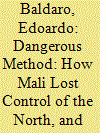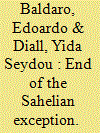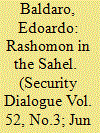| Srl | Item |
| 1 |
ID:
159367


|
|
|
|
|
| Summary/Abstract |
This article analyses changes and failures in the northern Mali system of security governance, taking into account the period running from the declaration of the Malian Third Republic (1992) to the present. Considering northern Mali as an area of limited statehood, the article develops a comparative diachronic analysis, distinguishing between three phases, namely Militiarisation (1992–2002), Fragmentation (2002–2012) and Multiplication (2013–ongoing). For every phase the focus is on (1) the mechanisms of coordination among actors, (2) the distribution of coercive capacities and ruling power and (3) the forms of authority. Unintended consequences and collective problems are highlighted, in order to understand the current situation of insecurity in the area.
|
|
|
|
|
|
|
|
|
|
|
|
|
|
|
|
| 2 |
ID:
178525


|
|
|
|
|
| Summary/Abstract |
Until the beginning of 2020, the Sahel was something of an exception with respect to international rivalry between jihadists. This came to an end when violent clashes involving supporters of Al-Qaeda and those affiliated with the Islamic State were recorded in central Mali. The violent escalation that has taken place between Katiba Macina and Islamic State in the Greater Sahara in the inner Niger Delta should be framed as a battle between a dominant power whose position has begun to be contested, and a rising challenger trying to exploit the situation. More specifically, the rise of Islamic State appears directly connected to the material and symbolic crisis of the system of governance established by Katiba Macina in the area under its control. As the result of a process that cuts across various developments in the recent history of Mali, the conflict between the two jihadist movements threatens to unlock a new and more violent phase in Mali’s longstanding crisis.
|
|
|
|
|
|
|
|
|
|
|
|
|
|
|
|
| 3 |
ID:
178344


|
|
|
|
|
| Summary/Abstract |
The African Sahel is a region whose geopolitical dimensions are constantly changing and evolving as a result of new intersections of international, regional and local security dynamics. In this context, various actors have initiated different regional projects in an attempt to reframe the area according to their interests and specific interpretations of security and to impose the form of order that best fits with their goals. The discursive, normative and material struggle about the definition of the region is having obvious effects on security and conflict, furthering regional instability. This article disentangles the different region-building initiatives at work in the area by identifying the four groups of actors advancing a specific project around the Sahel, namely: (1) international security deliverers, (2) jihadist insurgent groups, (3) regional governmental elites, and (4) local communities and populations. In so doing, it explores how the different spatial and security imaginaries advanced by these four collective agents struggle and interact, and shows that the Sahel can be considered the unintended result of a competitive process that is furthering conflict and violence in a shifting regional security system.
|
|
|
|
|
|
|
|
|
|
|
|
|
|
|
|